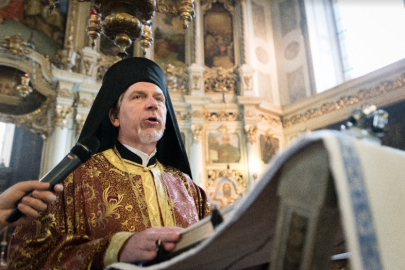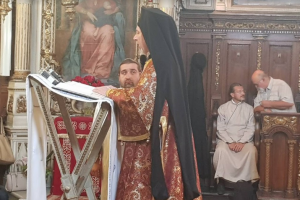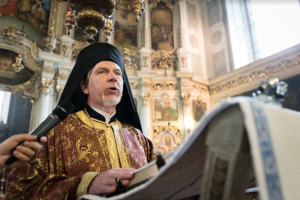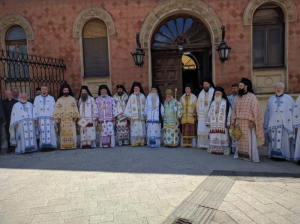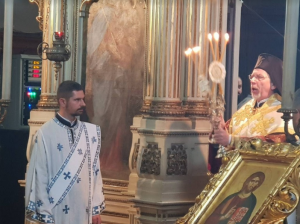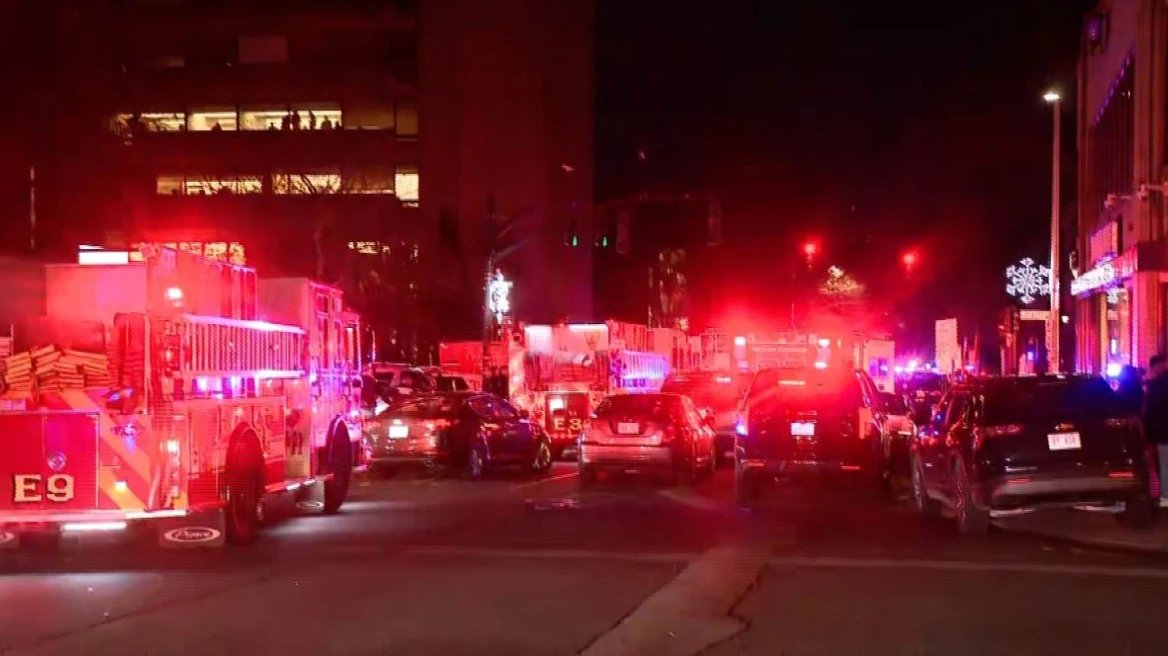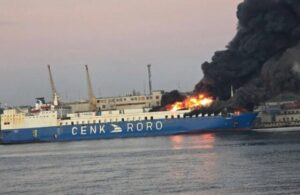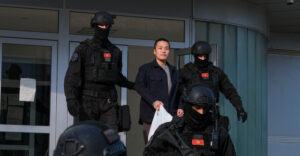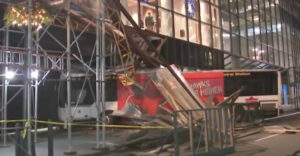His Eminence Metropolitan Cleopas of Sweden was in Serbia last week for an official visit. On June 3rd, an Archierarchical Liturgy at the St. George Cathedral in Novi Sad was held where the Metropolitan of Sweden gave the following sermon.
Your Eminences,
Your Excellencies,
Your Graces,
Reverend Presbyters and Deacons,
Dearly Beloved Brothers and Sisters in Christ,Although one week has passed since the feast of the Pentecost, according to the Orthodox festal calendar, we are continuing in the wake of this Great feast commemorating the sacred and historic event that took place in Jerusalem fifty days after the Resurrection of Christ, marking the starting point of the Church’s historic course and laying the groundwork for the sanctification of all human history and civilization.
The Acts of the Apostles describe in detail the events of the Pentecost (2:1-13). Ten days after Christ’s Ascension, His disciples were all gathered under the same roof. Suddenly, there came a noise like a turbulent wind borne out of the sky, and it filled the whole house where they were sitting. And there appeared before them tongues of fire, which parted and came to rest, one upon each one of them. And they were all filled by the Holy Spirit – the Paraclete that Christ had promised to send to His disciples – and they began to speak in all the languages of the people who were there.
That day in Jerusalem, devout Jews from all over the world had gathered to celebrate the Jewish feast of Pentecost. There were Parthians, Medes, and Elamites, and those living in Mesopotamia, both Judea and Cappadocia, Pontus, Asia, Phrygia, Pamphylia, Egypt, Cyrene, Romans living in the city, Cretans, and Arabs. Some of them were of Jewish descent and some were proselytes, however, all of them were amazed to hear Christ’s disciples speaking in the native languages of all the people comprising that multitude about the wondrous works of God. Some of them remained astounded, while others mocked them saying that the disciples were drunk.
St. Peter the Apostle undertook to speak to the crowds that had gathered. He reminded them of everything that God had said to the Israelites through the Prophet Joel: “And in the last days … I will pour forth my Spirit upon all flesh, and your sons and your daughters shall prophesy…”(Acts,2:14). Then he spoke to them about the Risen Lord. Finally, he called upon those gathered there to repent and be baptized.
The event of the Pentecost and St. Peter’s sermon resulted in three thousand people becoming believers and being baptized. And so, the first Church was founded as the Body of Christ, and it changed the course of humanity.
On the day of Pentecost, the confounding of the languages at the Tower of Babel was overcome through the unity granted by the Paraclete, which arose from the acceptance of a multitude of languages and cultures. The meek, scared fishermen/disciples of Christ, were transformed – through the descent of the Holy Spirit – into courageous preachers of the Gospel. And so, the foundations of the historic path of the Church, which gradually began to sanctify and transform humanity and the history of the world through its ministry, were laid.
Since that day, the Holy Spirit has guided the Church and given people the ability to know the truth. And this truth is Christ and the new mode of existence that He invites mankind to partake in. The knowledge of this truth frees people from every form of bondage.
Addressing the Holy and Great Council of the Orthodox Church that was convened in Crete, His All-Holiness Ecumenical Patriarch Bartholomew, to Whom I express my filial gratitude for appointing me head of the delegation of the Venerable Ecumenical Patriarchate to the General Assembly of the Council of European Churches here in Novi Sad, Serbia, termed Pentecost as “the Church’s starting point in its historical journey and laid the foundations for the sanctification of human history in its entirety… a day of crying out to the gracious Paraclete to come and abide in us and keep us in Its Truth and Its sanctification.”
Elsewhere in His address, the Ecumenical Patriarch offers additional thoughts that stand out for their immense importance, when He says: “the only road on our course in this world is unity. Of course, this road demands a living sacrifice, much work, and is achieved after great struggle.”
It is this unity and collaboration that we have gathered here in Novi Sad over the past few days to celebrate and partake in. Our gathering occurs during a difficult period in the course of human events, but it does so in order that through our prayers and action we may lend our support to humankind’s downtrodden existence and dignity, which is under attack from a modern proclivity towards various forms of exploitation, the abuse of power, forced labor, the enlisting of fighters in armed conflicts, the trafficking of organs, the refugee and migration crisis, forced begging, human trafficking and prostitution, slavery, and other evils whose primary victims are the most vulnerable groups in our society – children.
In October 2017, I had the honor of accompanying Ecumenical Patriarch Bartholomew on His first official visit to Iceland, and I distinctly remember that during His meetings with the nation’s ecclesiastical and political leaders, He would systematically speak about sensitizing public opinion to environmental issues, the preservation of Creation, and the persecution of Christians in the Middle East, expressing His unwavering support, and in fact, pointing out that the persecution of Christians carries the risk of eliminating the Christian presence from the wider region altogether.
Millions of people of every religion and nationality are experiencing the hell of civil war and terrorism. The Christian people of these areas are minorities and their persecution is leading to their uprooting and mass relocation to other nations, forcibly changing the demographic, religious, and cultural map of the world.
The horrifying references to the massacres of Christians and the destruction of ancient churches and priceless monuments forming part of the world’s historic legacy give rise to negative outlooks for the future. Undoubtedly, we are speaking about a religious genocide that is under way!
That is why, more so than in any other era, unity and dynamic collaboration and cooperation among all the Churches is required in order to counter the aforementioned phenomena. This represents a unique opportunity to not dwell on whatever differences may exist between us, but instead to actively experience the virtues that characterize and unite us as Christians; in other words, faith, charity, and mutual support!
The unity of the Church – which is one of its fundamental qualities – arises from its very ontology, and particularly expresses its self-awareness, which was historically formulated in the most official and undisputable manner in the second dogmatic decision of the Ecumenical Council of 381 AD, which constituted the Nicene Creed, or Symbol of Faith.
In our faith, unity is the surest given. And truly, in the conscience of the body of the Church, its unity is completely and irrevocably safeguarded by the head of the Church – Christ – through the constant presence of the Paraclete, His Spirit, whose presence remains manifest in it since the day of Pentecost.
Unity remains an existential requirement. Unity represents the personal feat of collaboration between the members of the Church to successfully remain and safely bear fruit in the living and life-giving theanthropic body of Christ; the Church. To be precise, the unity of the Church is present and manifests itself institutionally in faith that is “activated by love,” in the active partaking of the divine holy sacraments and participation in worship, and in the administration of the Church. As a result, the three manifestations of the unity of the Church must be viewed as mutually dependent and inseparable parts of the single and integral unity of the Church.
The words of St. Clement, Bishop of Rome, are quite characteristic, when he speaks about the necessity of unity within the Church: “Why are there outbursts, arguments, divisions, schisms, and rivalries among us? Is there not one God for all of us, and one Christ, and one Spirit of Grace that is poured out upon us? Is not our calling to Christ one and the same? Why, therefore, do we disjoin and separate the members of Christ’s body and rise up against our very body, reducing ourselves to such a state of absence of love that we forget that we are members of one another’s body?” (The Unity of the Church, XL VI, 5-7)
At this point, allow me to congratulate the organizers of the General Assembly of the CEC for their choice of agenda topics – especially the choice of the excerpt from the Acts of the Apostles (1:8) “But you shall receive power when the Holy Spirit has come upon you; and you shall be witnesses to Me in Jerusalem, and in all Judea and Samaria, and to the end of the earth.”
According to the Book of Acts, the ecumenical mission of the disciples began with Christ’s commandment that they become witnesses to Him in Jerusalem and to the ends of the earth. It continued through the strengthening of the Apostles on the day of Pentecost with the descent of the Holy Spirit, which was a pre-requisite for their missionary work, which was first carried out in the Holy City and then throughout the nations, across the ecumene.
Holy Hierarchs, Reverend Fathers, and Brethren,
We live in a world of rising political, economic, environmental, and medical uncertainty, with epidemics like the Ebola virus, famines, wars, and horrible violence posing real threats to us. Our duty is to spread the Gospel and re-evangelize the people, as an instinctive expression of our sentiments of brotherly love for our brethren who are new to the faith and those who are in need, since “we are God’s fellow workers.” We do this, so that the Gospel may continue to have ecumenical prospects and the missionary work of the Church may have a role in contemporary life, with decisive influence, and represent a living testimony to God’s presence for a better world.
Amen!
Ask me anything
Explore related questions
